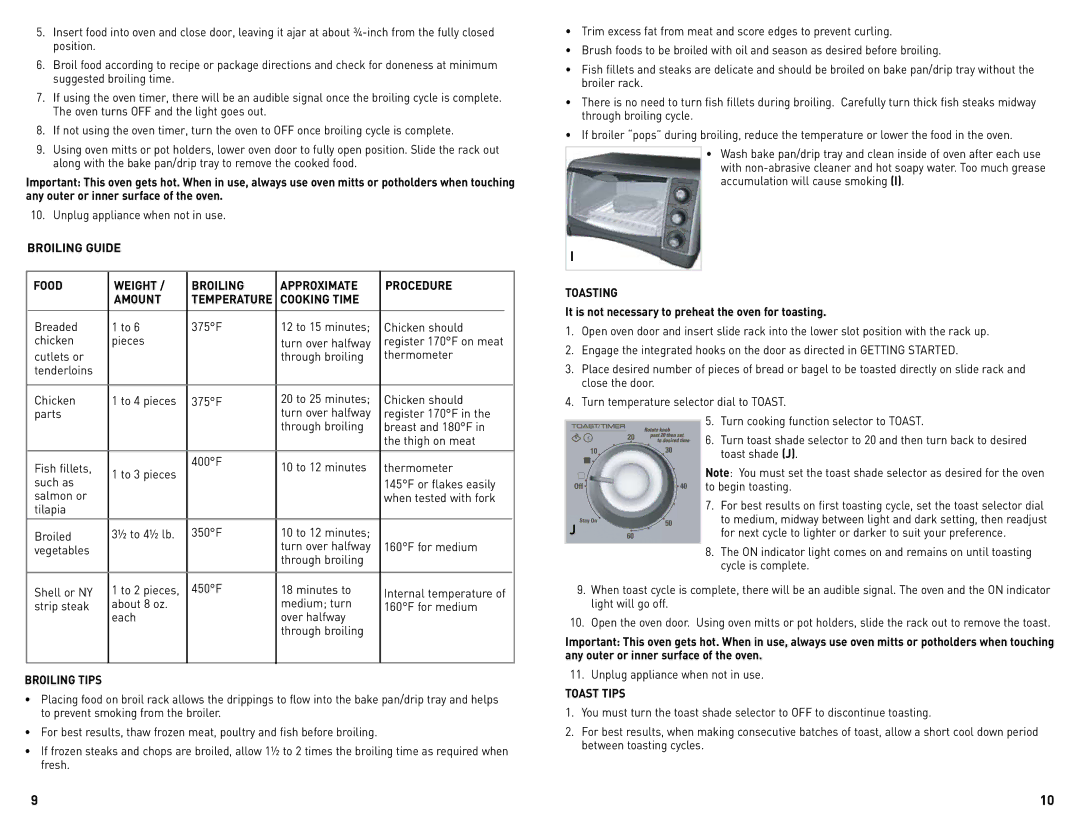
5.Insert food into oven and close door, leaving it ajar at about
6.Broil food according to recipe or package directions and check for doneness at minimum suggested broiling time.
7.If using the oven timer, there will be an audible signal once the broiling cycle is complete. The oven turns Off and the light goes out.
8.If not using the oven timer, turn the oven to Off once broiling cycle is complete.
9.Using oven mitts or pot holders, lower oven door to fully open position. Slide the rack out along with the bake pan/drip tray to remove the cooked food.
Important: This oven gets hot. When in use, always use oven mitts or potholders when touching any outer or inner surface of the oven.
10. Unplug appliance when not in use.
BROILING GUIDE
FOOD | WEIGHT / | BROILING | APPROXIMATE | PROCEDURE |
| |
| AMOUNT | TEMPERATURE | COOKING TIME |
|
|
|
|
|
|
|
|
|
|
Breaded | 1 to 6 | 375°F | 12 to 15 minutes; | Chicken should |
| |
chicken | pieces |
| turn over halfway | register 170°F on meat |
| |
cutlets or |
|
| through broiling | thermometer |
| |
tenderloins |
|
|
|
|
|
|
|
|
|
|
|
| |
Chicken | 1 to 4 pieces | 375°F | 20 to 25 minutes; | Chicken should |
| |
parts |
|
| turn over halfway | register 170°F in the |
| |
|
|
| through broiling | breast and 180°F in |
| |
|
|
|
| the thigh on meat |
| |
Fish fillets, | 1 to 3 pieces | 400°F | 10 to 12 minutes | thermometer |
| |
|
| |||||
such as |
|
| 145°F or flakes easily |
| ||
|
|
|
| |||
salmon or |
|
|
| when tested with fork |
| |
tilapia |
|
|
|
|
|
|
Broiled | 3½ to 4½ lb. | 350°F | 10 to 12 minutes; |
|
|
|
vegetables |
|
| turn over halfway | 160°F for medium |
| |
|
|
| through broiling |
|
|
|
Shell or NY | 1 to 2 pieces, | 450°F | 18 minutes to | Internal temperature of |
| |
strip steak | about 8 oz. |
| medium; turn | 160°F for medium |
| |
| each |
| over halfway |
|
|
|
|
|
| through broiling |
|
|
|
|
|
|
|
|
|
|
BROILING TIPS
•Placing food on broil rack allows the drippings to flow into the bake pan/drip tray and helps to prevent smoking from the broiler.
•For best results, thaw frozen meat, poultry and fish before broiling.
•If frozen steaks and chops are broiled, allow 1½ to 2 times the broiling time as required when fresh.
•Trim excess fat from meat and score edges to prevent curling.
•Brush foods to be broiled with oil and season as desired before broiling.
•Fish fillets and steaks are delicate and should be broiled on bake pan/drip tray without the broiler rack.
•There is no need to turn fish fillets during broiling. Carefully turn thick fish steaks midway through broiling cycle.
•If broiler “pops” during broiling, reduce the temperature or lower the food in the oven.
•Wash bake pan/drip tray and clean inside of oven after each use with
I
TOASTING
It is not necessary to preheat the oven for toasting.
1.Open oven door and insert slide rack into the lower slot position with the rack up.
2.Engage the integrated hooks on the door as directed in GETTING STARTED.
3.Place desired number of pieces of bread or bagel to be toasted directly on slide rack and close the door.
4.Turn temperature selector dial to TOAST.
5.Turn cooking function selector to TOAST.
6. | Turn toast shade selector to 20 and then turn back to desired |
| toast shade (J). |
Note: You must set the toast shade selector as desired for the oven | |
to begin toasting. | |
7. | For best results on first toasting cycle, set the toast selector dial |
J | to medium, midway between light and dark setting, then readjust |
for next cycle to lighter or darker to suit your preference. | |
8.The ON indicator light comes on and remains on until toasting cycle is complete.
9.When toast cycle is complete, there will be an audible signal. The oven and the on indicator light will go off.
10.Open the oven door. Using oven mitts or pot holders, slide the rack out to remove the toast.
Important: This oven gets hot. When in use, always use oven mitts or potholders when touching any outer or inner surface of the oven.
11.Unplug appliance when not in use.
TOAST TIPS
1.You must turn the toast shade selector to OFF to discontinue toasting.
2.For best results, when making consecutive batches of toast, allow a short cool down period between toasting cycles.
9 | 10 |
